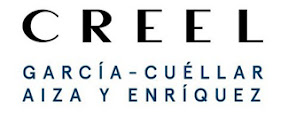TTAB Dismisses Opposition to "CREEL" for Legal Services: Acquired Distinctiveness Overcomes Section 2(e)(4) Surname Claim
In a 55-page opinion, the Board dismissed this eight-year-old TTABattle between two sets of Mexican lawyers over registration of the marks CREEL and CREEL, GARCÍA-CUÉLLAR, AIZA Y ENRÍQUEZ for "legal services." Opposer alleged that both marks are deceptive or deceptively misdescriptive under Sections 2(a) and 2(e)(1) of the Lanham Act, falsely suggest a connection under Section 2(a), and comprise the name of a living individual in violation of Section 2(c), and further that the CREEL mark is primarily merely a surname under Section 2(e)(4). The Board found that opposer failed to make out a prima facie case as to its claims, except for the surname claim. Opposer proved that CREEL is primarily merely a surname, but applicant overcame that refusal via proof of acquired distinctiveness. This summary will try to hit the high points. Creel Abogados, S.C. and Carlos Creel Carrera v. Creel, García-Cuéllar, Aiza y Enríquez, S.C., Opposition No. 91217047 (May 27, 2022) [not precedential] (Opinion by Judge Christopher Larkin).
Opposer Carlos Creel is a former partner of the applicant law firm, which was founded in 1936 by his father. Carlos Creel left the firm in 2013, but the firm continued to operate under the name Creel, García-Cuéllar, Aiza, y Enríquez and to use logos that emphasize the word CREEL.
Section 2(a) Deceptiveness and Section 2(e)(1) Deceptive Misdescriptiveness: Opposers argued that the opposed marks falsely indicate that a lawyer named "Creel" is a partner in applicant's firm and consumers will likely believe that the applicant law firm is affiliated with opposers. Alternatively, opposers argued that the term CREEL is misdescriptive as to a character, feature, and quality of applicant's legal services. The Board noted two "fundamental problems" with these arguments: first, the absence of legal authority that a surname may be merely descriptive of goods and services; and second, the absence of evidence to prove that CREEL is merely descriptive of legal service, as well as other elements of these claims.
Opposers' claims regarding public perception of the mark CREEL were based solely on legal argument. "The record simply lacks 'facts and evidence' showing what consumers are likely to think when they see" the opposed mark in connection with legal services. Opposers' "utter failure" to establish a prima facie case doomed both claims.
Section 2(a) False Connection and Section 2(c) Lack of Consent: Opposers argued that Carlos Creel is sufficiently well-known that consumers will think that he is in some way associated with applicant. However, there was no evidence regarding his prominence as a lawyer. In short, opposers "completely failed to establish a prima facie case in their case in chief."
Section 2(e)(4) Primarily Merely a Surname: The Board found that, although "Creel" is not a common surname, it is not so rare as to be not likely to be perceived as a surname in connection with legal services. The fact that several of the individuals involved in this saga are named "Creel" supports that finding, as do census listings and news articles about people named "Creel."
Applicant argued that "creel" has non-surname meanings, particularly in the contexts of fishing and weaving, but the Board pointed out that the term must be considered in the context of the goods and services at issue. The Board agreed with opposers that "Applicant did not name its law firm after a fishing rod . . . or a weaving loom." Applicant followed the common practice of keeping the name of a retired or departed partner (Carlos Creel's father) in the law firm name.
Acquired Distinctiveness: The Board exercised its discretion in allowing Applicant to add a claim of acquired distinctiveness at final decision, since the issue was joined in the pleadings and was briefed by the parties. The Board observed that, generally, five years' use alone is not enough to establish acquired distinctiveness of a surname. Applicant's testimony established that it registered the domain name creel.mx in 2009, that the mark CREEL has appeared on its masthead for many years, that it has served many U.S.-based clients and has close associations with a number of top U.S. law firms. It maintains an English language website to market its services to prospective U.S. clients. Moreover, there was no evidence of third-party use of a CREEL-formative mark in connection with legal services in the U.S.
The record shows that the CREEL mark has been used by Applicant substantially exclusively and continuously in commerce with the United States in connection with legal services for at least 10 years, and there is additional evidence discussed above that Applicant has achieved recognition by United States law firms and clients under the mark CREEL.
The Board found that applicant's CREEL mark has acquired distinctiveness for legal services and is entitled to registration on the Principal Register under Section 2(f).
Read comments and post your comment here.
TTABlogger comment: What about the prominent firms, Wolf and Fish?
Text Copyright John L. Welch 2022.



0 Comments:
Post a Comment
<< Home